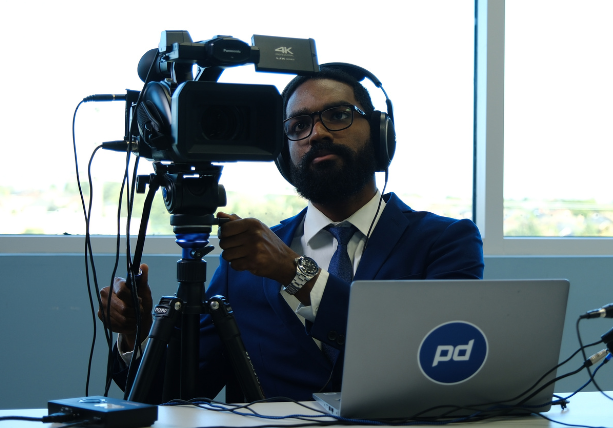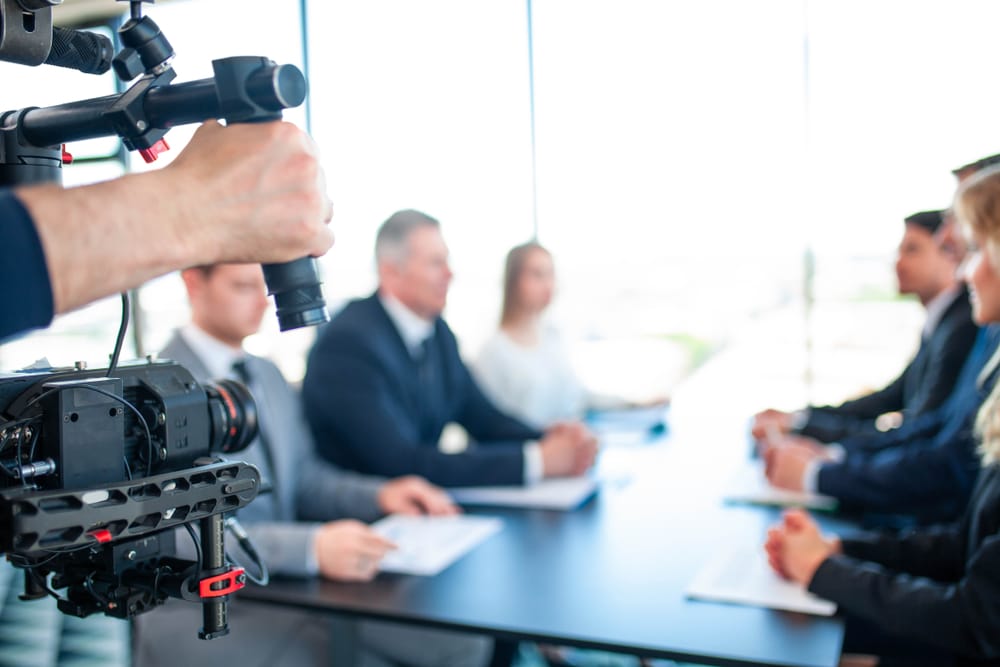The Significance of Legal Video Clip Depositions in Modern Legal Services: What You Need to Know
Lawful video depositions have ended up being vital in today's lawful landscape. They provide a multidimensional sight of witness testaments that standard records just can not match. By recording both non-verbal and spoken interaction, these depositions boost the overall understanding of a witness's integrity. Nevertheless, the effectiveness of video clip depositions hinges on numerous factors, consisting of conformity with legal requirements and best practices (legal video depositions). Checking out these elements reveals their true importance in modern-day lawful solutions
What Are Legal Video Depositions?
Lawful video clip depositions work as a vital tool in the lawsuits procedure. They entail tape-recording witness testimonies in a video clip layout, catching both verbal and non-verbal interaction. This method permits lawyers to record the attitude, expressions, and responses of witnesses, giving a richer context for the testament. Normally performed in a regulated environment, these depositions are led by lawyers who ask inquiries while a stenotype reporter documents the dialogue. The resulting video clip can be important for test preparation, as it enables attorneys to assess the trustworthiness of witnesses and improve their approaches. Furthermore, legal video depositions can be made use of in different lawful contexts, ranging from civil conflicts to criminal cases. The visual and auditory components of video clip depositions boost the presentation of proof, making it a necessary part in the modern-day legal landscape. Generally, they add significantly to the effectiveness and efficiency of lawful procedures.

Advantages of Video Depositions Over Traditional Approaches
Video clip depositions use various benefits contrasted to typical techniques of taking witness testaments. One significant advantage is the capacity to capture both aesthetic and audio aspects, offering a more complete document of the witness's declarations. This double style boosts clarity and permits lawyers to reference details subtleties throughout test prep work. Furthermore, video depositions assist in remote participation, making it less complicated for witnesses who may be inaccessible for in-person appearances due to geographical constraints or wellness issues.Moreover, video depositions can accelerate the overall deposition process, minimizing the moment and expenses linked with traveling and logistics. They additionally enhance availability, as videotaped depositions can be conveniently shared amongst lawful teams and referenced any time. This benefit adds to far better situation administration and preparation. Generally, video clip depositions stand for a modern, effective strategy to collecting witness testaments, aligning with the developing requirements of the legal career.
The Duty of Body Movement and Tone in Testimonies

In lawful video depositions, body language and tone play vital roles in sharing a witness's trustworthiness and trustworthiness. Nonverbal cues can supply understandings into a witness's emotional state, affecting just how their testament is regarded. Recognizing the effect of these components is crucial for jurors and lawyers alike when evaluating the dependability of a testament.
Nonverbal Communication Insights
While verbal communication is often stressed in lawful testaments, nonverbal cues such as body movement and tone play a crucial duty in sharing reputation and emotion. Observers of depositions may note that a witness's posture, motions, and facial expressions can considerably affect perceptions of reliability. Consistent eye contact may signal self-confidence, while avoiding look can suggest deceit or discomfort. Similarly, the intonation-- its pace, volume, and pitch-- can impart feelings of sincerity or uncertainty. Attorneys must be attuned to these nonverbal signals, as they often offer crucial context that matches spoken words. Comprehending these subtleties can enhance the performance of depositions and influence the end result of legal proceedings.
Emotional Tone Influence
The emotional tone conveyed during lawful testaments substantially influences just how a witness is perceived. Body language, singing inflections, and faces play vital functions fit the narrative of a testament. A witness exhibiting confidence via stable eye call and a tranquil tone can instill a sense of integrity and interaction. Conversely, indications of stress and anxiety, such as fidgeting or an unstable voice, might cause uncertainty regarding their account. The nuances of emotional expression can influence the interpretation of facts, making it essential for attorneys to identify these hints. In video clip depositions, the acoustic and visual components combine, emphasizing the significance of psychological tone in conveying genuineness and truthfulness Continued within the legal procedure.
Reputation and Reliability
A crucial element in developing integrity and reliability throughout testimonies lies in the witness's body language and intonation. Observers usually depend on non-verbal cues-- such as eye call, pose, and gestures-- to assess a witness's sincerity. For circumstances, a witness who keeps eye call and shows open body movement may be viewed as even more dependable and sincere than one that avoids eye contact or appears closed off. Additionally, intonation plays an important function; a steady, calm tone can strengthen the integrity of the testimony, while fluctuations in pitch or quantity may raise questions. Inevitably, the mix of body language and vocal tone considerably affects just how a witness's statements are obtained and analyzed in a legal context.
Ideal Practices for Carrying Out Video Clip Depositions
Carrying out video clip depositions calls for mindful planning and execution to assure a effective and clear discussion of testimony. It is important to pick a quiet, well-lit place to lessen disturbances and safe optimum video clip high quality. The equipment needs to be tested beforehand, including video cameras, microphones, and illumination, to stay clear of technological issues throughout the deposition.Next, events included need to review the style and treatments beforehand, seeing to it that everyone comprehends their functions. The deponent needs to be briefed on the process, including exactly how to react plainly and concisely.Additionally, keeping an expert attitude throughout the session is crucial. This consists of avoiding speaking over one an additional and validating that all inquiries are guided suitably. It is essential to tape-record the deposition in a layout that enables for very easy playback and evaluation, preserving the integrity of the testimony for future use.
Lawful Factors To Consider and Conformity Issues
Just how do lawful factors to consider and compliance concerns affect the efficiency of video clip depositions? Attorneys need to browse a complex landscape of policies, making sure that video depositions comply with jurisdictional regulations and requirements. Conformity with legislations concerning privacy, approval, and taping techniques is necessary. Obtaining specific approval from all celebrations included is needed to prevent lawful repercussions.Additionally, the admissibility of video evidence in court can pivot on compliance with step-by-step needs. Making certain that the devices made use of fulfills technological standards is likewise crucial, as inadequate quality can undermine the deposition's reliability.Moreover, lawyers need to understand any specific state laws that regulate video depositions, as these can vary substantially. Failing to deal with these considerations can not only jeopardize the stability of the deposition yet additionally impact the general instance approach, ultimately impacting the customer's legal results.
How Video Depositions Influence Jury Perception
While video depositions can work as effective devices in legal procedures, their impact on court understanding is considerable. The auditory and visual aspects of video recordings give jurors with a much more detailed understanding of witness temperament, reliability, and psychological reactions. This multimedia method can improve the jurors' capability to analyze the dependability of statement compared to traditional text-based transcripts.Moreover, video depositions enable jurors to observe body language, intonation, and facial expressions, every one of which can influence their interpretation of the witness's statements. The existence of a witness on Clicking Here screen can humanize them, promoting compassion and connection, which may persuade jurors' viewpoints. Conversely, a witness who appears unreliable or incredibly elusive on video might bring about negative understandings that affect a jury's decision. Inevitably, the dynamic nature of video clip depositions plays a vital duty fit how jurors analyze evidence and reach their verdicts.
The Future of Video Clip Depositions in Legal Practice
As developments in technology continue to improve the legal landscape, the future of video clip depositions is poised for significant advancement. Innovations such as expert system, online reality, and boosted video conferencing devices are expected to enhance the deposition procedure and boost ease of access. Attorneys may use AI-driven analytics to analyze witness credibility and instance toughness more effectively.Moreover, the assimilation of digital fact might enable juries to experience immersive simulations of depositions, supplying much deeper context and understanding. In addition, the fad towards remote depositions is likely to continue, providing greater adaptability for customers and attorneys alike.As remote job comes to be increasingly stabilized, video depositions will likely become standard technique, minimizing expenses and time restrictions connected with traditional methods. In general, these technical advancements guarantee to boost the efficiency, performance, and ease of access of video clip depositions in lawful practice, eventually changing how attorneys prepare for trial.
Frequently Asked Questions
Exactly How Much Do Lawful Video Depositions Typically Cost?

Can Video Clip Depositions Be Used in Any Kind Of Kind of Case?
Video depositions can be made use of in various kinds of instances, including civil, criminal, and household regulation. Their flexibility allows lawyers to existing witness testaments effectively, adapting to the specific requirements of various legal scenarios.
What Tools Is Needed for a Video Deposition?
To carry out a video clip deposition, important equipment consists of a high-quality cam, microphone, lights, and a dependable recording gadget. Furthermore, a computer with modifying software program might be essential for post-production and formatting the last video.
For how long Does a Typical Video Clip Deposition Last?
A regular video deposition lasts in between two to four hours, depending on the complexity of the situation and the number of questions posed. Prolonged sessions may happen, however breaks are normally included for individual convenience.

Are Video Clip Depositions Admissible in Court?
Video depositions are typically permissible in court, supplied they abide by lawful criteria and policies of proof. Their use enhances clearness and protects witness testament, aiding in the judicial procedure throughout trials and hearings. Legal video depositions have ended up being important in today's lawful landscape. Furthermore, legal video depositions can be made use of in numerous legal contexts, ranging from civil conflicts to criminal situations. Furthermore, video depositions help with remote engagement, making it simpler for witnesses who may be unavailable for in-person looks due to geographical constraints or wellness issues.Moreover, video clip depositions can expedite the total deposition procedure, decreasing the time and expenses associated with traveling and logistics. Making certain that the tools used i was reading this meets technological standards is likewise vital, as poor quality can threaten the deposition's reliability.Moreover, lawyers must be mindful of any particular state legislations that regulate video depositions, as these can vary significantly. Additionally, the pattern towards remote depositions is most likely to continue, using higher flexibility for customers and lawyers alike.As remote work comes to be significantly stabilized, video depositions will likely come to be typical technique, decreasing prices and time restraints linked with typical approaches.